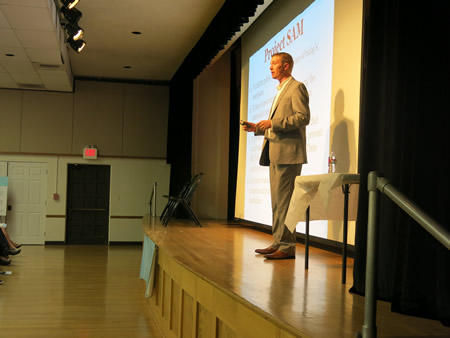By Marilynn Young | LB Indy
After offering to host a discussion about marijuana at Thurston Middle School next month, school officials did an about-face this week and canceled the presentation.

The talk titled “Are We the Next Colorado?” is sponsored by the Laguna Beach Community Coalition, a group of school, health and law enforcement representatives initially organized to reduce youth drug and alcohol abuse.
Ben Cort, a drug policy expert from the San Diego-based nonprofit Smart Approaches to Marijuana, who was scheduled to speak March 10 in Laguna, plans similar presentations in Huntington Beach and San Clemente around the same time.
Laguna Beach school district spokeswoman Leisa Winston said the talk was canceled due to a conflict with a similar event March 21. “We felt that it would be redundant and possibly difficult for parents to attend two similar presentations within such a short span of time,” she said in an email, adding that information on the school-sponsored talk will be distributed next week.
Coalition organizers hope to find an alternate venue in Laguna for Cort’s talk.
Laguna Beach High School Vice Principal Bob Billinger, listed on the Cort flyer as a contact, did not return calls seeking comment about the cancellation.
The cancellation comes as a surprise since substance abuse and the mental health of students has been a hot topic.
Last October, a cluster of suicides by four young adults and two parents in the past two years prompted a suicide previous workshop at the high school. Mental health workers say depressed youth often self-medicate by abusing drugs.
In 2010, 48 percent of Laguna Beach High School 11th graders reported they consumed alcohol within the past 30 days in the California Healthy Kids survey, the highest rate in the county. The survey also showed more ninth-graders reported feelings of hopelessness.
Some in the community made known their disagreement with Cort’s talking points, which were outlined in a flyer distributed last week. Among the issues Cort addresses is the spike in marijuana use by youth and marijuana-related ER visits since weed was legalized in Colorado.
The talk follows a move earlier this month by the Laguna Beach City Council to reconsider a ban on marijuana delivery services.
In an email this week, resident Mike Beanan complained to Billinger that he felt the school-based discussion about marijuana needed a more balanced approach and should also address substance abuse of alcohol and prescription drugs.
“There’s a lot of blow-back and it’s not good to mislead our youth,” said Beanan in an interview. The local resident says he uses medical marijuana to manage PTSD. He served as a Navy Seal in Vietnam.
“Our society legalized marijuana in 1996 and our school principal needs to get with it,” said Beanan, adding that no one wants children to use drugs of any kind.
San Clemente High School also plans a 45-minute school assembly with Cort on March 8. “I do not know why Laguna Beach cancelled their meeting; our principal backed us when we wanted to have ours. We had one last year, too,” said Susan Parmelee, a clinical social worker at The Wellness and Prevention Center embedded in San Clemente High and a co-sponsor of Cort’s visit. She hopes to reschedule the event elsewhere in Laguna.
The San Clemente Community Center will host a two-hour community discussion with Cort the same evening. Parmelee plans a follow up question and answer period in ninth grade health classes after the assembly.
The wellness center was established at the school in the wake of a suicide cluster among San Clemente youth in 2011.
In the center, Parmelee sees once high-achieving students start smoking marijuana and shift to stronger drugs. “Parents have spent their college tuition for their kids on rehab,” she said. “It can really take over their lives. My hope is that for people to listen to every side and how it can impact a community.”





Study: Cannabis Use Not Predictive Of Lower IQ, Poorer Educational Performance
“… to test the relationships between cumulative cannabis use and IQ at the age of 15 and educational performance at the age of 16. After full adjustment, those who had used cannabis more than 50 times did not differ from never-users on either IQ or educational performance. Adjusting for group differences in cigarette smoking dramatically attenuated the associations between cannabis use and both outcomes, and further analyses demonstrated robust associations between cigarette use and educational outcomes, even with cannabis users excluded. These findings suggest that adolescent cannabis use is not associated with IQ or educational performance once adjustment is made for potential confounds, in particular adolescent cigarette use.”
Source: C Mokrysz, et al. Clinical Psychopharmacology Unit, University College London. Published January 6, 2016 in Journal of Psychopharmacology.
Daily Marijuana Use Is Not Associated with Brain Morphometric Measures in Adolescents or Adults
“No statistically significant differences were found between daily users and nonusers on volume or shape in the regions of interest. Effect sizes suggest that the failure to find differences was not due to a lack of statistical power, but rather was due to the lack of even a modest effect. In sum, the results indicate that, when carefully controlling for alcohol use, gender, age, and other variables, there is no association between marijuana use and standard volumetric or shape measurements of subcortical structures.”
The Journal of Neuroscience, 28 January 2015, 35(4): 1505-1512; doi: 10.1523/JNEUROSCI.2946-14.2015
An ever-growing body of scientific research clearly demonstrates that Marijuana is less addictive than a cup of tea.
Dr. Jack E. Henningfield of the National Institute on Drug Abuse and Dr. Neal L. Benowitz of the University of California at San Francisco ranked six psychoactive substances on five criteria.
Withdrawal — The severity of withdrawal symptoms produced by stopping the use of the drug.
Reinforcement — The drug’s tendency to induce users to take it again and again.
Tolerance — The user’s need to have ever-increasing doses to get the same effect.
Dependence — The difficulty in quitting, or staying off the drug, the number of users who eventually become dependent
Intoxication — The degree of intoxication produced by the drug in typical use.
The tables listed below show the rankings given for each of the drugs. Overall, their evaluations for the drugs are very consistent. It is notable that marijuana ranks below caffeine in most addictive criteria, while alcohol and tobacco are near the top of the scale in many areas.
The rating scale is from 1 to 6 — 1 denotes the drug with the strongest addictive tendencies, while 6 denotes the drug with the least addictive tendencies.
HENNINGFIELD RATINGS
Withdrawal Reinforcement Tolerance Dependence Intoxication
Nicotine 3 4 2 1 5
Heroin 2 2 1 2 2
Cocaine 4 1 4 3 3
Alcohol 1 3 3 4 1
Caffeine 5 6 5 5 6
Marijuana 6 5 6 6 4
BENOWITZ RATINGS
Withdrawal Reinforcement Tolerance Dependence Intoxication
Nicotine 3 4 4 1 6
Heroin 2 2 2 2 2
Cocaine 3 1 1 3 3
Alcohol 1 3 4 4 1
Caffeine 4 5 3 5 5
Marijuana 5 6 5 6 4
Good! SAM presents a biased and very inaccurate view of cannabis! You’d do better to just go online and find a copy of “Granny Storm Crow’s List” and just start reading!
[…] did you cancel the marijuana talk?” The school administrator stared back. I tried again. “Why did you cancel […]